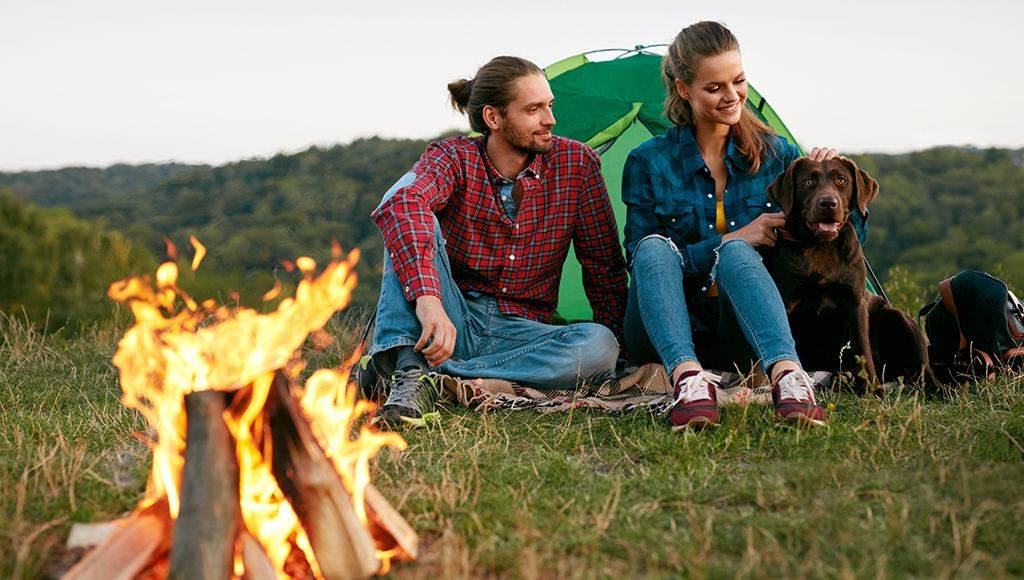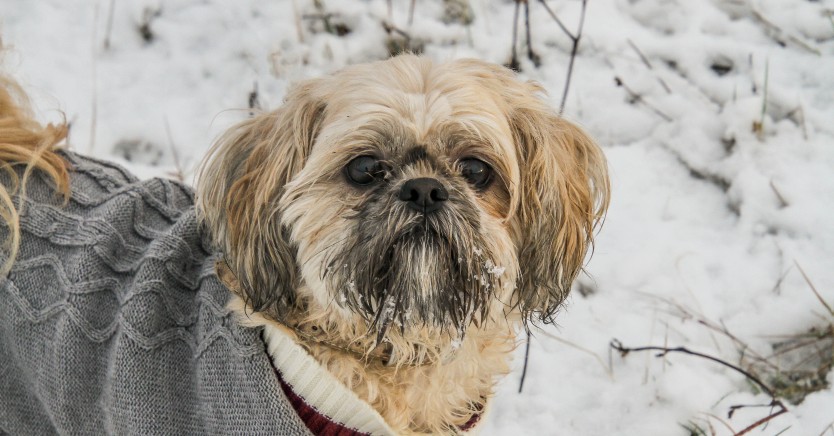Camping With Your Dog Can Be Fun!
Bringing along your dog on the family camping trip can be a great way to bond further with your beloved pet.

Bringing along your dog on the family camping trip can be a great opportunity for you to bond further with your beloved pooch, while providing a great way to give him the exercise he needs to stay healthy.
EXERCISE
Dogs need to stay active just as much as humans do. More and more pets are becoming overweight and struggling with some of the same health problems that humans face as a result of carrying too much excess body fat. One of the very best ways to combat this and ensure your dog doesn't face the complications of obesity is to get him outdoors and moving around. Camping trips offer many opportunities to enjoy outdoor activities while providing exercise in pleasant and enjoyable ways.
Camping trips are excellent sources of physical activity because you are outdoors and have access to a wide variety of recreations. You can take your dog on hikes in the nearby woods or for strolls around the camping site. You may also be able to find a grassy area to just run around or play fetch and Frisbee. If there is a stream or creek on the campgrounds, your dog may also enjoy swimming or splashing around on a hot day.
BONDING
When you get out in the wilderness with your dog, you will bond with him in ways that just can't happen at home sitting on the couch. Camping offers a lot of uninterrupted time to pet and love your dog as well as some time to sit and just relax while enjoying your beautiful surroundings together. There are many benefits for your dog if you take him along for a camping adventure. Your dog will love being outdoors for extended periods, unlike the short periods at home to relieve himself or go on a short walk. Taking your dog with you on a camping trip rather than leaving him behind to be boarded at a kennel, or babysat by strangers, will do a world of good for your relationship with him, as long as you select a dog-friendly campsite.
DISCOVERY
Camping with a dog can be a joyous experience for both owner and dog. Dogs discover interesting things on walks and hikes, that you might otherwise overlook. Dogs are thrilled at new smells and surroundings of a camp site, which will be a treat to watch, and add a measure of adventure to your trip. You will notice new traits in your dog's personality that you had never seen before. Unlike hiking, your dog does not have to be in the best physical shape to go camping, plus you'll be able to take more supplies with you than you can when hiking.
PROTECTION
Your dog can also offer an extra source of protection for you and your family. Sleeping outdoors in an area you aren't completely familiar with and around people who you don't really know can present some dangers, though you should look into the safety ahead of time. Dogs can alert you to others walking onto your campsite and provide a real sense of protection when it comes time to sleep at night.
TRAINING OPPORTUNITES
If you have a smaller puppy or a dog that is still being trained on skills such as socializing with others, camping is a good opportunity to challenge their new skills and see how much progress they are making. For instance, a dog that is being trained to stay by your side and not chase after birds, squirrels, and other passing creatures and objects will have countless opportunities to master this skill in an active campground environment.
Good canine manners will go a long way towards creating good will and increased tolerance of canine presence. Know your dog and his personality. Be aware of what situations may make him act strangely or provoke an aggressive or defensive reaction. Be aware at all times of what is going on around you, and try to prevent these situations that will frighten or cause your dog anxiety. You should never take a dog out on the trail if you feel there is any chance of someone being injured by him.
PREPARATIONS
- Vaccinations and License - It is of absolute importance that
your dog's vaccinations be up-to-date, as dogs can encounter
unvaccinated animals while camping. Dog licenses should also be
current. Ask your Veterinarian about the areas where you will be
camping/traveling, as some places have additional health risks
for dogs and may warrant additional precautions.
- Know your dog:
- What excites your dog?
- What puts your dog "on guard"?
- What makes your dog bark, growl or whimper?
- Know how to read your dog's body language - know what
angers him, and how to calm him down. Learn to read his tail,
eyes, ears and body posture. If you can't anticipate your
dogs reactions to various situations, there is no way you are
ready to camp with your dog around strangers in unfamiliar
surrounds.
- Start with short day trips - Dogs stress out when their
routine changes. Too much stress can lead to erratic, even
aggressive behavior, even illness. Getting your dog used to
the many scenarios he'll encounter while camping in the weeks
before your trip is easy and fun. It will also help you
further know and bond with your dog:
- Take your dog on a day trip every week, for at least
four
weeks prior to your camping trip.
- Take along the dog bed and dog bowl you intend to use
while camping; this will help your dog feel more
comfortable in the unfamiliar campsite surroundings.
- Try to replicate the situations your dog will
experience during a camping trip: long drives, walking
around in a new area, playing, sitting and reading (in
other words, quiet time), having a meal, your dog sitting
in the backseat while you get gas,
etc.
- Put up your tent in the back yard the week before you
camp, or as near the date as possible. Sit inside of it
each day and read a book or put your headphones and
listen to some music. Put your dog's bed beside you.
Don't force your dog inside, but do give your dog lots of
attention if he joins you. Even if he never joins you,
you will have helped sensitize him to the tent.
- Take your dog on a day trip every week, for at least
four
- What excites your dog?
- Physical Demands - while camping with your dog is not nearly
as physically demanding as hiking, for many dogs, camping will
mean some increase in physical activity, however slight. There
will be more opportunities for walking, running and exploring
than are usually found in the day-to-day routine, and the terrain
may be more challenging. A visit to the veterinarian to evaluate
general health is a good idea before your dog camps for the first
time.
- Leash your dog - no matter how well-behaved you think your
dog is. It is both inconsiderate and dangerous to other campers
NOT to have your dog under control at all times. Your friendly,
unleashed dog could wander into a campsite where there may be an
aggressive dog or an aggressive person, and the results could not
only be disastrous, but may even be deadly. Don't chance it --
keep your dog leashed, unless you can absolutely assure that your
dog will NOT leave your campsite without you, even if a dog or
other animal wanders by. Don't assume every person is a dog lover
and wants to get a closer look.
- Bedding - bring bedding (a blanket, an air mattress, etc.) to
keep your dog off the ground. If it's a cloth bed, you'll need
something under the bed to keep the cold from the ground coming
up through the bedding and chilling your dog. A tarp or piece of
plastic will go a long way in keeping the dog bedding dry and
clean. Also plastic underneath cloth beds that are laid directly
on the ground, outside the tent, to keep out moisture.
- Food and water - clean drinking water is a must for both you
and your dog. Although natural water sources may be plentiful
near a campsite, the water may be contaminated with parasites,
harmful bacteria or chemicals. In areas where giardia is a
problem you should not allow your dog to drink from streams or
lakes. Call the nearest park ranger station to find out the
condition of streams and lakes in the area you will be visiting.
It's a good idea to carry a 10-gallon plastic container of water
from home. Don't be fooled by cooler weather, into thinking you
don't need as much water. Adequate fluid levels are essential for
heat maintenance in both temperature extremes. Drink plenty of
water and encourage your dog to do the same.
I take two-extra days of dog meals beyond our planned stay, just in case. Whatever you use for food storage, it should be sturdy and water proof. It should also be critter proof. If there is a bear box at the camp site, USE IT to store dog food, your food, anything that food has been in, your tooth paste, etc. This isn't just to keep bears out, but to keep out the variety of other critters who will go for dog food or any other food if they smell it. If there is no bear box, but there might be bears around, hang your food in a tree. If bears aren't a danger, then keep all food and potentially smelly items in your vehicle.
- Toys and familiar items - Dog comb and brush, dog toys, dog
treats, and extra bags or newspapers and scoop for dog
cleanups.
Before you set out on your camping trip, make sure you check with the campsite on whether they allow dogs. Not all campsites do allow dogs, but there are a greater number of them now than ten years ago and the number is steadily increasing. Most campsites that allow dogs will require a leash, so please adhere to their regulations, both for safety and to help ensure you and your dog enjoy your camping experience.
Ready to start saving money on pet wellness care?
Then take a look at Mint Wellness, the pet wellness plan that provides fast reimbursement on routine pet care. Save on vaccinations, wellness exams, preventatives, dental, and more!
Learn More
.jpg)

